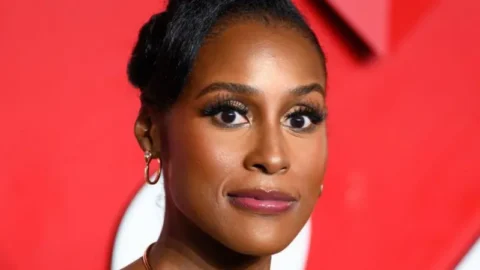Nollywood actress Opeyemi Aiyeola has taken a bold stand in response to a recent social media jab made by fellow actress and political appointee, Eniola Badmus.
The drama unfolded after Aiyeola shared a video on her Instagram page in which her receding hairline was visible. While fans and followers reacted with mixed comments, it was Eniola Badmus’s comment that struck a nerve.
The actress-turned-Special Assistant to the Speaker of the House of Representatives, Tajudeen Abass, commented under the post, asking, “Ope where is your front hair?” — a remark many considered insensitive and unnecessary.
Opeyemi Aiyeola did not take the comment lightly. In a response video shared on her page, she expressed deep disappointment and frustration, especially because the comment came from someone who had once been the target of public ridicule and body shaming herself.
A visibly emotional Aiyeola stated, “This livestream is for Eniola Badmus. I have decided not to pay attention to the ignorant and evil set of people. I understand the way the internet is and there are a lot of animals in human form, but I have only decided to reply to her.”
Her words highlighted how personal and hurtful the comment felt, coming from someone who should know better.
Aiyeola didn’t hold back as she reminded Badmus of her own past. “You used to be an image of ridicule and body shaming online,” she said.
“To now think that you, who once experienced the hurt and pain of body shaming, could come under my video to do the same thing…”
The tone of betrayal was unmistakable in Aiyeola’s voice, as she called out what she saw as a lack of empathy and growth on Badmus’s part.
According to her, it wasn’t just about the comment, but what it represented — a form of internalized cruelty and public mockery that should no longer have a place among women who’ve experienced similar struggles.
Continuing her statement, Aiyeola made it clear that Badmus had never shown public support for her or her work in the past.
“You have never promoted anything that has to do with me before,” she said. “But for you to come under my post to drop this comment, I swear to God that you are an animal.”
The statement, though harsh, captured her raw emotions. Aiyeola seemed to express that what made the comment most painful wasn’t just its content, but the history and silence that preceded it — no support, no friendship, just a public insult.
She also took the opportunity to address the broader issue of how beauty is often misunderstood and misrepresented. “You think beauty is about physical appearance? You are ignorant,” she said, with conviction. In her view, beauty goes beyond what is seen — it is about grace, empathy, and inner strength.
She lamented the fact that many people, even those in the public eye who have been victims themselves, continue to judge and shame others based on appearance.
It was a moment of truth, and for many of her supporters, it was a message that needed to be heard.
In closing, Aiyeola shared a final word of caution to those around Badmus, saying, “I pity people that have you around as their friend.”
The statement wasn’t just a personal dig — it was a reflection of how toxic behavior, especially from those in power or public roles, can affect the people around them.








